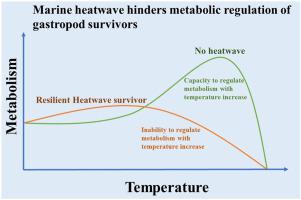Marine Environmental Research ( IF 3.0 ) Pub Date : 2020-08-15 , DOI: 10.1016/j.marenvres.2020.105117 Deevesh A Hemraj 1 , Natasha C Posnett 2 , Jay J Minuti 1 , Louise B Firth 3 , Bayden D Russell 1

|
Marine heatwaves (MHWs) are an emerging threat to marine organisms that have increased in frequency and magnitude in the past decade. These extreme heating events can have differential impacts on organisms with some experiencing mortality while others survive. Here, we experimentally exposed two species of subtidal gastropod (Trochus sacellum and Astralium haematragum) to two realistic intensities of MHW to test the ability of different species to physiologically cope with extreme heating events. Extreme MHW conditions caused 100% mortality in both species within five days. While both species survived under moderate MHW conditions they showed evidence of nonadaptive metabolic depression. Both species demonstrated an inability to upregulate their metabolic rates at the higher temperatures following exposure to a MHW (i.e. reduced temperature of maximum metabolic rate; TMMR), suggesting a lack of molecular protective responses and ongoing physiological damage. Therefore, the physiological damage endured by heatwave survivors may lessen their ability to cope with subsequent stress until fully recovered. Repairing this damage may have serious repercussions for the rate of recovery of these normally resilient species and their ability to maintain their ecological functions post MHW, especially under the predicted increasing frequency, duration and magnitude of MHWs.
中文翻译:

幸存但不安全:海洋热浪阻碍了两个腹足动物幸存者的新陈代谢。
海洋热波(MHW)是对海洋生物的新兴威胁,在过去十年中,海洋生物的频率和强度都在增加。这些极端的加热事件可能会对生物体产生不同的影响,其中一些会死亡,而另一些会生存。在这里,我们实验性地暴露了两种潮下腹足纲动物(Trochus sacellum和Astralium haematragum)的两种现实强度的MHW,以测试不同物种在生理上应对极端高温事件的能力。极端的MHW条件导致五天内两种物种的死亡率均达到100%。虽然这两个物种都在中度MHW条件下存活,但它们显示出非适应性代谢抑制的证据。暴露于MHW后,两个物种均无法在较高温度下上调代谢速率(即最大代谢速率降低的温度;TMR)),表明缺乏分子保护反应和持续的生理损伤。因此,热浪幸存者所遭受的生理损害可能会降低他们应付随后的压力直至完全恢复的能力。修复这种损害可能会对这些通常具有复原力的物种的恢复速度及其在MHW后维持其生态功能的能力产生严重影响,尤其是在预测的MHW频率,持续时间和强度增加的情况下。









































 京公网安备 11010802027423号
京公网安备 11010802027423号